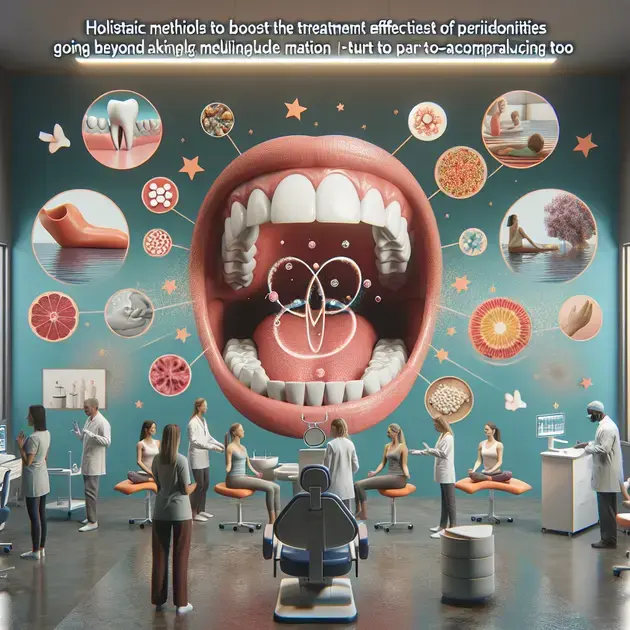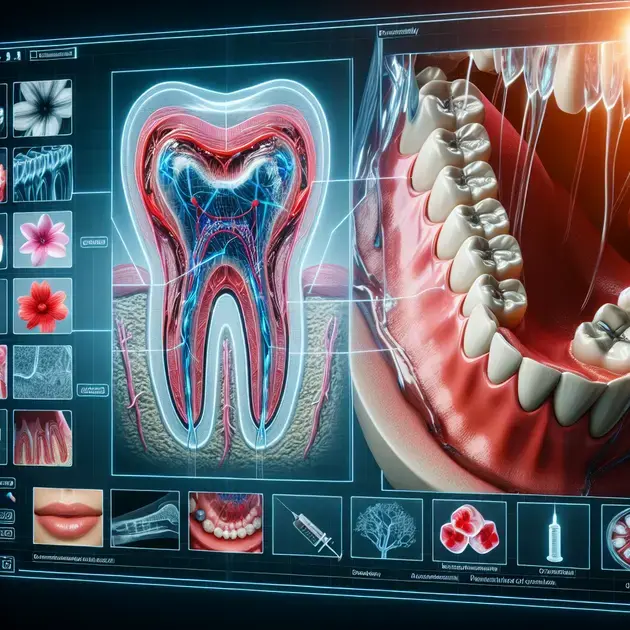Are you looking for the most effective medication for periodontitis? Look no further! This comprehensive guide will provide you with all the information you need to understand the best treatment options available for this common dental condition.
Periodontitis is a serious condition that requires prompt and proper treatment to prevent further damage to your gums and teeth. With the help of this guide, you will be able to make informed decisions about your oral health and find the most suitable medication to combat periodontitis effectively.

Effective Medication Options for Periodontitis
Introduction
Periodontitis is a serious gum infection that damages the soft tissue and destroys the bone that supports your teeth. When it comes to effective medication options for periodontitis, it’s crucial to understand the various treatment methods available to manage the condition.
Available Medication Options
There are several medication options used in the treatment of periodontitis. Antibiotics such as doxycycline, minocycline, and tetracycline are commonly prescribed to control bacterial infections in the gums. These medications can be taken orally or applied directly to the infected area as a gel.
To find the best medication for your specific case of periodontitis, it is essential to consult with a dentist or periodontist. They will assess the severity of your condition and recommend the most suitable treatment plan, which may include a combination of medications.
Step-by-Step Guide to Medication Administration
1. Visit your dentist or periodontist for a comprehensive evaluation of your oral health.
2. Discuss your symptoms and any previous treatments you’ve undergone for periodontitis.
3. Follow the prescribed dosage and administration instructions provided by your healthcare provider.
4. Monitor your progress and report any side effects or concerns to your healthcare team.
5. Maintain good oral hygiene practices, including brushing and flossing regularly, to support the effectiveness of the medication.
Understanding Periodontitis Treatment
Overview of Periodontitis Treatment
Treating periodontitis involves a combination of professional dental care and at-home oral hygiene practices. The goal of treatment is to reduce inflammation, control infection, and prevent further damage to the gums and bone.
Professional Treatment Procedures
Common professional treatments for periodontitis include scaling and root planing, where plaque and tartar are removed from the teeth and roots to promote healing. In severe cases, surgery may be required to repair damaged tissues and reattach the gums to the teeth.
At-Home Care Tips
To support the treatments received at the dentist’s office, it’s essential to maintain good oral hygiene at home. This includes brushing at least twice a day, flossing daily, and using an antiseptic mouthwash to control bacterial growth.
Additionally, adopting a healthy lifestyle with a balanced diet rich in vitamins and minerals can help boost your immune system and aid in the healing process of periodontal tissues.
Choosing the Best Medication for Periodontitis
Consulting with a Healthcare Provider
When it comes to choosing the best medication for periodontitis, it’s crucial to consult with a dental professional. Your dentist or periodontist will consider factors such as your overall health, the severity of the infection, and any allergies or sensitivities you may have to certain medications.
Personalized Treatment Plan
Your healthcare provider will create a personalized treatment plan tailored to your specific needs. This plan may include antibiotic therapy, antimicrobial mouth rinses, or other medications to control bacterial growth and reduce inflammation in the gums.
Follow-Up and Monitoring
It’s important to follow your prescribed medication regimen diligently and attend all follow-up appointments with your healthcare provider. Regular monitoring of your progress will allow adjustments to be made to ensure the effectiveness of the treatment plan.
By working closely with your dental team and following their recommendations, you can choose the best medication for periodontitis and improve the health of your gums and teeth.

Understanding Periodontitis Treatment Medications
When it comes to treating periodontitis, medications play a crucial role in managing the condition effectively. Periodontitis treatment medications are designed to combat the bacterial infection that causes gum disease and reduce inflammation in the gums. These medications are often prescribed in conjunction with other treatments, such as scaling and root planing, to achieve the best results.
There are several types of medications used in the treatment of periodontitis, including antibiotics, antiseptics, and antimicrobial mouth rinses. Antibiotics can be taken orally or applied directly to the gums to target the bacteria responsible for the infection. Antiseptics, such as chlorhexidine, help reduce plaque and prevent further bacterial growth. Antimicrobial mouth rinses are used to clean the mouth and reduce the number of bacteria.
It is essential to follow your dentist or periodontist’s instructions carefully when using these medications. Be sure to take the prescribed dosage at the recommended times to maximize their effectiveness. In some cases, your healthcare provider may adjust the medications or treatment plan based on your response to the medication.
Understanding the role of medications in treating periodontitis is crucial for effectively managing the condition and improving your oral health. By working closely with your dental healthcare team and following their recommendations, you can achieve better outcomes and maintain a healthy smile.
Exploring Periodontitis Medication Options
When exploring medication options for periodontitis treatment, it is essential to consider the specific needs of each patient. The choice of medication will depend on the severity of the gum disease, the patient’s medical history, and any underlying health conditions. Your dentist or periodontist will evaluate your oral health and recommend the most appropriate medication for your individual case.
Common medications used for treating periodontitis include antibiotics, such as doxycycline and minocycline, which help reduce bacteria and inflammation in the gums. Other options may include antimicrobial mouth rinses, like essential oils, which can help control plaque and gingivitis. Your healthcare provider may also recommend antiseptic gels or chips that can be placed directly in the periodontal pockets to target bacteria.
It is important to discuss any allergies or sensitivities you may have with your dental provider before starting any medication. Be sure to inform them of any medications or supplements you are currently taking to avoid potential interactions. By exploring different medication options and working closely with your dental team, you can find the most effective treatment plan for your periodontitis.
Overall, exploring medication options for periodontitis is a key step in managing the condition and preventing further damage to your gums and teeth. By taking an active role in your oral health and following your healthcare provider’s recommendations, you can improve the health of your gums and enjoy a brighter smile.
Maximizing Treatment Efficacy with Proper Medication Management
Proper medication management is essential for maximizing the efficacy of periodontitis treatment and achieving optimal results. To ensure the success of your treatment plan, it is important to follow these key steps:
Step 1: Understand Your Medications
Take the time to learn about the medications prescribed to you by your dentist or periodontist. Understand their purpose, dosage instructions, and potential side effects. If you have any questions or concerns, don’t hesitate to ask your healthcare provider for clarification.
Step 2: Stick to the Treatment Plan
Consistency is crucial when it comes to taking medication for periodontitis. Be diligent about taking your prescribed medications at the recommended times each day. Skipping doses or discontinuing medication prematurely can compromise the effectiveness of the treatment.
Step 3: Communicate with Your Healthcare Provider
Keep your dentist or periodontist informed of any changes in your oral health or overall well-being while taking medication. If you experience any unexpected side effects or symptoms, notify your healthcare provider immediately. They may need to adjust your treatment plan accordingly.
Step 4: Maintain Good Oral Hygiene
Medications alone are not enough to manage periodontitis effectively. It is essential to maintain good oral hygiene practices, such as brushing twice a day, flossing regularly, and attending dental check-ups. These habits will support the effectiveness of the medication and contribute to overall oral health.
Step 5: Monitor Your Progress
Regularly scheduled follow-up appointments with your dental team are essential for monitoring the progress of your treatment. During these visits, your healthcare provider will evaluate your oral health, adjust the treatment plan if necessary, and provide guidance on maintaining a healthy smile.
By following these steps and actively participating in your periodontitis treatment, you can maximize the efficacy of medications and improve your oral health outcomes. With proper medication management and a commitment to good oral hygiene, you can take control of your gum disease and enjoy a healthier, happier smile.
Conclusion
Periodontitis treatment medications are crucial for managing the condition effectively by combating bacterial infections and reducing gum inflammation. They are often prescribed in combination with other therapies like scaling and root planing for optimal results. Understanding the role of medications in treating periodontitis is fundamental for improving oral health outcomes. By following your healthcare team’s guidance, you can achieve better results and maintain a healthy smile.
Exploring periodontitis medication options involves considering individual patient needs based on disease severity, medical history, and underlying health conditions. Common medications such as antibiotics and antimicrobial mouth rinses can help reduce bacteria and control plaque. By discussing allergies and sensitivities with your dental provider and actively engaging with your healthcare team, you can establish the most effective treatment plan for your periodontitis.
Maximizing treatment efficacy through proper medication management requires understanding your prescriptions, adhering to the treatment plan consistently, and communicating any changes to your healthcare provider. Good oral hygiene practices, regular monitoring of progress, and follow-up appointments are essential for managing periodontitis effectively. By following these steps and committing to proper medication management, you can take charge of your gum disease and enhance your oral health for a brighter, happier smile.



